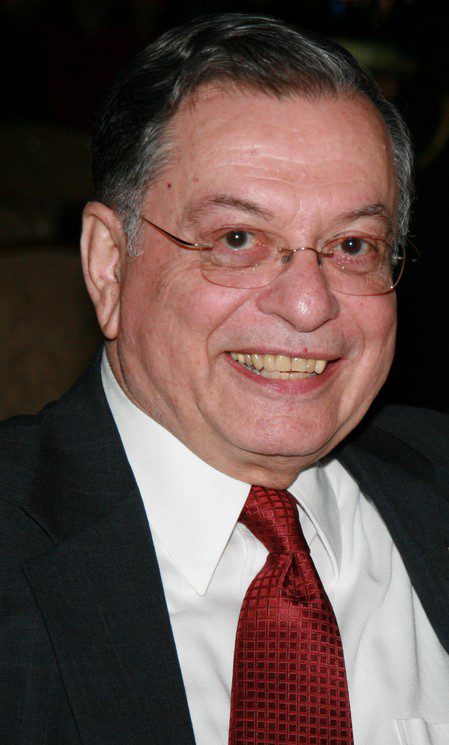
After 16 years of service, Jerry Landsberg is passing the baton to a new Great Neck Water Pollution Control District commissioner as he sets forth on a new venture – retirement.
“I’ve been doing it for 16 years and that’s enough,” Landsberg said. “It’s time for some of the younger people to step forward and do it.”
Landsberg was appointed to the board in October of 2007 to finish the term of a previous commissioner who had resigned.
“The rest” he said, “is history.”
Landsberg, who serves on the board alongside Commissioners Patty Katz and Steve Reiter, will be replaced in the new year by Mark Berger. Berger was voted onto the board in the district’s Dec. 12 election.
Landsberg, who turned 90 this past summer, jokingly said he thinks he’s deserving of some time off.
But stepping into retirement, Landsberg said he questioned how he would spend his newfound time.
“One of the big trepidations that I’ve had in going forward with retirement is what I would do with my time,” Landsberg said.
In retirement, Landsberg said he doesn’t see himself entirely stepping away from his community but rather taking away more time to spend with his family.
“I don’t think I’m really leaving so much as just not going to work there,” Landsberg said.
He said he will continue volunteering with other organizations he is a part of, saying he’s retiring from his position but not quitting the work he does for his community.
“When you stop working, you stop living,” Landsberg said.

The outgoing commissioner said one of his greatest achievements while on the board started at the onset of his appointment when former County Executive Tom Suozzi sought out the district to merge with the county’s sewer system.
Landsberg said he helped fight to keep the district independent and still standing.
He said Suozzi planned to redirect the Great Neck sewer waste to the South Shore. He called this plan “impractical” and dangerous to implement a singular pipeline that all of Great Neck would be reliant on.
“And if that pipeline was interrupted in any way, the Great Neck peninsula would have no sewage disposal,” Landsberg said. “There was no backup plan and it just made no sense whatsoever.”
Landsberg said this fight persisted for years.
He said when it faced a vote, it was apparent that residents overwhelmingly wanted to keep their own sewer district in place.
While the Great Neck Water Pollution Control District survived, staying in compliance with mandated, lowered nitrogen levels, the district went on to absorb the sewer plant for the Village of Great Neck.
“The Great Neck Water Pollution Control District was the surviving entity,” Lansberg said.
Now, Landsberg said, the Great Neck Water Pollution District is home to one of the most modern and cutting-edge wastewater disposal plants in the Northeast.
Another notable accomplishment Landsberg said he’s proud of during his tenure is the district’s advancement of environmentally conscious initiatives. He attributed much of this work to the district’s Superintendent Chris Murphy.
Landsberg said Murphy has been able to bring innovative ideas to the district which the board has been willing to entertain and implement, saying it is “the reason that [the district has] become really a first-class plant.”
He said the district produces 50% of its own electricity to run its plants, keeping costs down and diminishing negative impacts on the environment.
Another accomplishment of the district that Landsberg said is unique is its grease-receiving station.
Landsberg said all restaurants are required to have grease traps to collect all the waste for proper disposal, separate from wastewater.
As the grease has to go somewhere, the waste can now be dumped at the district’s grease-receiving station where it is treated at the wastewater plants. Previously, companies who collected the restaurant’s grease waste had to drive to Riverhead or even New Jersey.
He said this grease treatment process is one of the methods the plant produces energy to run the plants.
Landsberg said that while he couldn’t pin down a singular moment from his time on the board that he could look fondly upon, it was rather the work overall that he found rewarding and kept him serving on the board.
“I don’t think in the past 15-20 years I’ve done anything that I’ve had more pleasure from or really enjoyed more than the work that I’ve done with the wastewater improvement district,” Landsberg said.
He said he has become very close with the staff at the district and foresees continuing those friendships and a relationship with the district.
“It really is more of a family than a workplace,” Landsberg said.
As for the new commissioner, Landsberg offered some advice for Berger: “Take the job seriously.”
He said he is confident that the new commissioner will do so.
As for the rest of the district, Landsberg said he hopes they continue being a leader in the industry and push forward the work they’ve been able to accomplish in past years.






